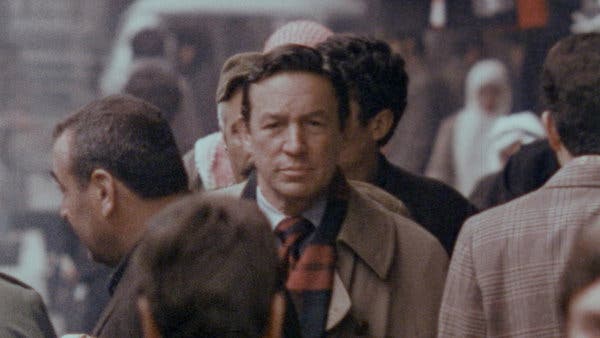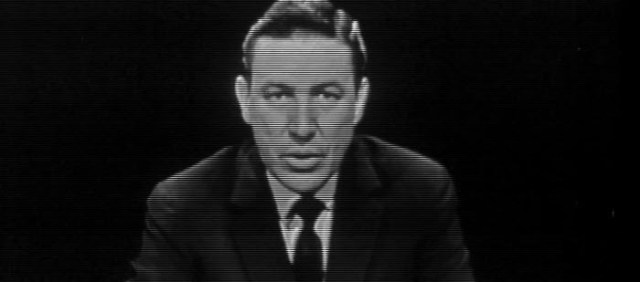
Documentary film “Mike Wallace Is Here” attempts to presents the overview of the career of Mike Wallace, who was one of the most prominent TV journalists in US for many years before his death in 2012. Instead of merely depending on that familiar talking-head approach, the documentary simply gives us a series of various archival footage clips associated with Wallace, and we come to know more about his considerable influence and then muse a bit one his ambiguous legacy.
After setting the tone with an interview clip between Wallace and Bill O’Reilly, the documentary gives us a brief summary of the early period of Wallace’s TV career. He initially worked as an actor/pitch man in the 1950s, but he soon came to realize his potential as a TV reporter/interviewer, and he subsequently began to work as the host of a late-night interview program titled “Night Beat” on ABC. Unlike many other TV interviewers at that time, who usually asked easy questions to their interviewees, Wallace did not hesitate to throw hard questions at his interviewees, and his tough approach certainly drew lots of attention at that time, though his program did not last that long.
Anyway, Wallace kept working as devoting himself more to TV journalism, and then a tragedy occurred to him in 1962. After hearing that one of his sons from his first marriage was suddenly disappeared in the middle of his summer vacation in Greece, he quickly flied to Greece although he was doing another reporting job on the other side of the Earth, and then he eventually found what happened. As he admits to us via one archival clip, it was quite painful for him to discover his son’s untimely death for himself, and we can sense the incident cast a long shadow on his personal life.

Nevertheless, Wallace somehow found some strength for bouncing up from this gloomy low point of his personal life, and we see how quickly he rose after starting to work in CBS in the early 1960s. Although CBS was already filled with prominent public figures including Walter Cronkite, Wallace was not so daunted by that at all, and he subsequently became the lead reporter of “60 Minutes” as closely working with his longtime friend/colleague Don Hewitt.
As presenting many different public figures interviewed by Wallace, the documentary makes a good point on how Wallace happened to be at the right time and the right place for attaining his enormous success and reputation. During the 1960s, the American society was being shaken a lot due to a number of big social/political issues including the Vietnam War and racism, and Wallace was ready to press upon those hot issues as throwing sensitive questions to his various interviewees ranging from Martin Luther King Jr. to Richard Nixon. When he interviewed Malcolm X, Wallace did not pull any punch at all as being straightforward and no-nonsense as usual, and Malcolm X responded to him with equally frank attitude, while also quite candid about the growing possibility of getting himself killed someday (It did happen a few months after the interview, by the way).
In case of Nixon, he liked Wallace a lot from the start, and he even offered Wallace a big position in his Presidential campaign, but, ironically, Wallace came to pounce upon the Watergate Scandal several years later. Once what was initially reported by the Washington Post turned out to be true, Wallace and “60 Minutes” went all the way for reporting more truth to the public, and we get a silent but tense moment between Wallace and a certain key figure in the Watergate Scandal.

After that point, Wallace and “60 Minutes” found themselves on the top of TV investigate journalism in US, and they also dealt with some important international issues. Not long after the Iran revolution broke out in 1979, Wallace was requested to interview Ayatollah Khomeini, and the following interview with Khomeini was inarguably one of the biggest successes in Wallace’s career, though the documentary indirectly points out that the interview might cause the assassination of Egyptian President Anwar Sadat, whom Khomeini declared an enemy to be eliminated during the interview.
Meanwhile, Wallace and “60 Minutes” often got themselves into several tricky circumstances. In 1982, General William Westmoreland, who was the commander of the US Army Forces during the Vietnam War, sued Wallace and CBS for libel shortly after Wallace’s interview with him was broadcast, and, though it was eventually settled outside the court, this legal dispute set an alarming precedent which could threaten that precious rights of free press. In case of that famous interview with Jeffrey Wigand, which is incidentally the main subject of Michael Mann’s Oscar-nominated film “The Insider” (1999), Wallace tried as much as he could for broadcasting that sensitive interview on TV despite the pressures from those executives of CBS, and it is no wonder that he was not so pleased with how he was portrayed in “The Insider”.
Although it does not delve that deep into Wallace’s personal life except his long history of depression, “Mike Wallace Is Here” works as a vivid, compelling presentation of Wallace’s long career, and director Avi Belkin did a competent job of generating an engaging narrative flow out of heaps of archival footage clips. Yes, Wallace was indeed a pioneer in his field, but it can also be said that, as shown from O’Reilly and other crackpots in Fox News, he and “60 Minutes” inadvertently led American TV journalism to more sensationalism, and it will be interesting to see how his achievement will be regarded in the future.







